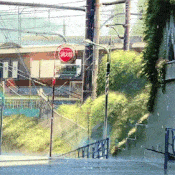|
Leperflesh posted:Oh I completely agree. Watering lawns is a drop in the bucket in terms of overall consumption of water in the state. But I believe we got started on this topic by discussing the very wealthy individuals spending many thousands of dollars a month to water their palatial estates? And I also think there's something to be said for reversing or fighting the acculturation that makes people prefer (totally unnatural) trimmed green patches of lawn, to (much more natural) varied gardens of native plants. Because if we as Californians can take personal responsibility for making good decisions about water use, we're more likely to insist on the government and private industry reforms necessary to make large-scale water conservation and sustainability possible.
|
|
|
|

|
| # ? May 16, 2024 03:40 |
|
Here's a thing I did for a real estate developer who wanted to reposition an existing "traditional" southern California landscape to be more xeric. This is where we started, about a year ago:  This was planted about two months ago and is starting to fill in. Not all of the plants are native - some are native to Australia and South Africa - but all are appropriate for the local climate (once they are established, that is). Because this is a commercial project, it will still be served by high-efficiency drip irrigation on a controller that has rain sensors.  All of this rain is pretty rad, my projects are going to look pretty good in the spring.
|
|
|
|
I'm wondering if the almond problem won't solve itself when China starts putting $$$ into its own almond orchards.
|
|
|
|
Arsenic Lupin posted:My daughter and a friend drove SF-Fresno day before yesterday. They passed fields and fields of almonds, giving them the stink-eye as they drove, and saw a couple of signs to the effect of "What's wrong with growing food for money?" Almonds use a lot of water, but they are a very high value crop that provides substantial economic benefit, and they grow better here than anywhere else in the world. It's the fuckers flooding the desert to grow alfalfa and rice that are so infuriating. Those crops are very low value and they grow anywhere, and they use a ton of water, but the fuckers that grow that poo poo have senior water rights and don't have to pay squat for the water that they waste, so they don't give a gently caress. Those people should have their land taken away under eminent domain.
|
|
|
|
predicto posted:substantial economic benefit To whom? And I agree about alfalfa but really, are we going to individually legislate plant types? I think the broader question is, should we regulate farm use of water in ways that discourage its use for water-intensive cash crops grown primarily for export - which very definitely applies to almonds as well as alfalfa. Rice is mostly grown in delta wetlands regions, and rice paddies actually can support native wetland wildlife. It's a more complex situation there.
|
|
|
|
Arsenic Lupin posted:I'm wondering if the almond problem won't solve itself when China starts putting $$$ into its own almond orchards. Perhaps, but China doesn't really have a good climate for almonds, and their water problems in the north where they might be able to grow them are worse than California's.
|
|
|
|
Leperflesh posted:And I agree about alfalfa but really, are we going to individually legislate plant types? I think the broader question is, should we regulate farm use of water in ways that discourage its use for water-intensive cash crops grown primarily for export - which very definitely applies to almonds as well as alfalfa.
|
|
|
|
Leperflesh posted:To whom? The best solution, of course, is to charge enough for water that farmers have to make rational decisions based on the actual value of what they are producing. I don't have any fundamental problem with growing crops for export. We need to export things. I have a problem with using water wastefully.
|
|
|
|
Arsenic Lupin posted:Basically, if both river water use *and* subterranean drilling were re-regulated so that water wasn't going unmetered to farmers, the cost per acre of growing water-hungry plants would rise. Right now, the cost of growing water-hungry plants doesn't reflect the water usage. Another big problem is how to regulate the use of underground aquifers, which are shrinking at unsustainable rates. Agreed. Groundwater regulation is a must.
|
|
|
|
Arsenic Lupin posted:I'm wondering if the almond problem won't solve itself when China starts putting $$$ into its own almond orchards. If China could grow almonds on a scale that would satisfy their need, they'd have done it a long time ago because it would be much cheaper. California is one of the few places in the world that has the Mediterranean climate that is essential to growing almonds. California provides the lion's share of almonds to China vs other areas with a similar climate because shipping over the Pacific from California to China is cheap as hell and hassle free. Barring export caps, California is going to continue feeding China's almond habit.
|
|
|
|
Leperflesh posted:To whom? You don't have to do any legislation besides selling water for an appropriate price. If people can make a profit with water extensive crops that should be because it's an especially valuable commodity or because water is cheap, not because they have a water quota to burn through.
|
|
|
|
Leperflesh posted:Oh I completely agree. Watering lawns is a drop in the bucket in terms of overall consumption of water in the state. Noggin Monkey posted:Here's a thing I did for a real estate developer who wanted to reposition an existing "traditional" southern California landscape to be more xeric. Replacing grass for residential users makes sense because it just doesn't get used that much relative to how much grass there is, but that's not true for public spaces. Basically "grass for aesthetic purposes = no, grass for frequently-used functional purposes = yes". Cicero fucked around with this message at 02:31 on Oct 24, 2015 |
|
|
|
Sydin posted:California is one of the few places in the world that has the Mediterranean climate that is essential to growing almonds. I had no idea. Thank you.
|
|
|
|
Cicero posted:This just seems kind of dumb for public spaces to replace that much grass. The grass is usable for walking and sitting. The shrubs (?) that replaced it are not. That's funny, because I think it's kind of dumb to jump out and make blanket statements without understanding context. This isn't a public space, it's a private office development that no one used because it was open and exposed. By removing the turf, we create a sense of enclosure, which has encouraged people to use the space, reduced water usage and created a cohesive aesthetic between the old buildings and the new. I have also designed several popular urban parks and would wager that I understand balancing usable public open space and managing water resources better than you do.
|
|
|
|
Noggin Monkey posted:That's funny, because I think it's kind of dumb to jump out and make blanket statements without understanding context.
|
|
|
|
Cicero posted:That's cool, I meant it less as a criticism of this specific example and more of a general statement on where we should care about replacing plants, I should have phrased it differently. I 100% agree. Lawns and even interactive fountains make much more sense in the public realm of densely populated areas, where you can amortize (so to speak) the value of the water across a large number of users. In suburbia that's a harder argument to make. Anza Borrego fucked around with this message at 05:19 on Oct 24, 2015 |
|
|
|
Noggin Monkey posted:Here's a thing I did for a real estate developer who wanted to reposition an existing "traditional" southern California landscape to be more xeric. Can you give us any numbers (% or absolute) for the water use reduction? I'm just curious.
|
|
|
|
GrumpyDoctor posted:Can you give us any numbers (% or absolute) for the water use reduction? I'm just curious.
|
|
|
|
GrumpyDoctor posted:Can you give us any numbers (% or absolute) for the water use reduction? I'm just curious. Order of magnitude is probably 50% or more, I'll see if I can find be calls from the irrigation designer but... CopperHound posted:I imagine the savings do not kick in until the plants have had a season or two to get their roots established. Yes, this is correct.
|
|
|
|
Noggin Monkey posted:Here's a thing I did for a real estate developer who wanted to reposition an existing "traditional" southern California landscape to be more xeric. Regardless of the actual water savings, it looks a lot nicer, too. The rows of nothing but grass looked quite drab.
|
|
|
|
Sydin posted:Regardless of the actual water savings, it looks a lot nicer, too. The rows of nothing but grass looked quite drab. Yup. And the taller grasses are going to sway beautifully in the wind, which plain ol' lawn won't do.
|
|
|
|
Arsenic Lupin posted:Yup. And the taller grasses are going to sway beautifully in the wind, which plain ol' lawn won't do. Awesome native grass choices: Wild Rye, Leymus condensatus 'Canyon Prince' Tufted Hair Grass, Deschampsia cespitosa Deer Grass, Muhlenbergia rigens California Fescue, Festuca californica Sweet grass-like plants: Lomandra, Lomandra longifolia 'Breeze' Dianella, Dianella 'Clarity Blue' Cape Rush, Chondrioetalum tectorum
|
|
|
|
Noggin Monkey posted:Awesome native grass choices: I'm glad to see weird cultivar names extend to grasses too. "Canyon Prince" has to be the best name.
|
|
|
|
Noggin Monkey posted:Awesome native grass choices: Thank you! ::makes notes::
|
|
|
|
Arsenic Lupin posted:Thank you! ::makes notes:: Good evergreen shrubs: Native: Coffee berry, Rhamnus californica 'Eve Case' Adapted: Coast Rosemary, Westringia fruiticosa 'Wynabbie Gem'
|
|
|
|
Noggin Monkey posted:Good evergreen shrubs: (looks hopeful) Fragrant shrubs or plants? And yeah, I know about rosemary and lavender.
|
|
|
|
Noggin Monkey posted:Awesome native grass choices: you removed the pines at the top row but what replaced them ? looks like crepe myrtle or even olive? I'm doing fruitless olives, sage, rosemary, lavender, grasses for my front dirt lot pretty soon. Maybe a few 12 foot max dwarf cypress as well since i have a Mediterranean style house in inland norcal.
|
|
|
|
Keyser S0ze posted:you removed the pines at the top row but what replaced them ? looks like crepe myrtle or even olive? True Green Chinese Elm. Nooooooo dwarf cypress you make landscape Jesus cry. Arsenic Lupin posted:(looks hopeful) Fragrant shrubs or plants? And yeah, I know about rosemary and lavender. Rosemary is ok but gently caress lavender, too temperamental. Spanish only.
|
|
|
|
Noggin Monkey posted:Rosemary is ok but gently caress lavender, too temperamental. Spanish only.
|
|
|
|
Ceanothus comes in a wide variety of... uh, variteties. It's a native mostly-evergreen shrub (or small tree if you train it to be a tree) that flowers annually, and is very hardy and drought tolerant. Deer eat the leaves in the spring, they attract native bees and hummingbirds, and you can make tea from the leaves if you want.
|
|
|
|
FRINGE posted:What about the sages? California has lots of native drought loving flowering sages. Plus there are a number of well adapted ones too.
|
|
|
|
Leperflesh posted:Ceanothus comes in a wide variety of... uh, variteties. It's a native mostly-evergreen shrub (or small tree if you train it to be a tree) that flowers annually, and is very hardy and drought tolerant. Deer eat the leaves in the spring, they attract native bees and hummingbirds, and you can make tea from the leaves if you want. Ceanothus is bloody enormous, though. Not just a shrub but a big shrub. And, yes, I do have the one creeping variety in my garden.
|
|
|
|
Trabisnikof posted:California has lots of native drought loving flowering sages. Plus there are a number of well adapted ones too. I've got a sage growing in a very small square of dirt next to my garage door, surrounded by concrete. It gets 100% sun all day, and I have never watered it. I have to trim it every four to six months and that's the only thing it ever needs. It also seems to flower most or all of the year, and it attracts both hummingbirds and bumblebees, along with the occasional butterfly or two. Native sage is a fantastic choice as long as you can give it loads of sun and otherwise neglect the gently caress out of it.
|
|
|
|
Leperflesh posted:I've got a sage growing in a very small square of dirt next to my garage door, surrounded by concrete. It gets 100% sun all day, and I have never watered it. I have to trim it every four to six months and that's the only thing it ever needs. It also seems to flower most or all of the year, and it attracts both hummingbirds and bumblebees, along with the occasional butterfly or two. Bees loving love sage, so plant sage.
|
|
|
|
FRINGE posted:What about the sages? Tons of great sages. Two I really like are: Native Black Sage, Salvia clevelandii Adapted Mexican Bush Sage, Salvia leucamtha 'Santa Barbara' Leperflesh posted:Ceanothus comes in a wide variety of... uh, variteties. It's a native mostly-evergreen shrub (or small tree if you train it to be a tree) that flowers annually, and is very hardy and drought tolerant. Deer eat the leaves in the spring, they attract native bees and hummingbirds, and you can make tea from the leaves if you want. Ceanothus are cool and good but they have some serious issues getting established in the garden and I have pretty much stopped using them because of that. Arsenic Lupin posted:Ceanothus is bloody enormous, though. Not just a shrub but a big shrub. And, yes, I do have the one creeping variety in my garden. There are a lot of different varieties, some get pretty large.
|
|
|
|
Definite yes: Marijuana initiative Definite yes vote out of pure spite: Large magazine initiative, if it makes the ballot Definite no vote: Referendum for $2b+ projects gently caress if I know, at this point: Pretty much everything else
|
|
|
|
Losing federal highway funds because of our lower drinking age would be interesting.
|
|
|
|
My local power company is an IOU (investor owned utility) and it's great. When they had that big solar push about 4 years ago they couldn't sell me on it because my rates were so low and it would have taken something like 23 years to break even. Meanwhile, over in SoCal Edison land, they're breaking even in 13 years. Getting the whole state on those rates would be great.
|
|
|
|

|
| # ? May 16, 2024 03:40 |
|
 I mean I understand the health rationale, but if anybody honestly thinks the porn industry is going to completely retool itself vs just packing up and moving to Nevada or somewhere else where nobody gives a poo poo what they do, they're an idiot. I mean I understand the health rationale, but if anybody honestly thinks the porn industry is going to completely retool itself vs just packing up and moving to Nevada or somewhere else where nobody gives a poo poo what they do, they're an idiot.Who needs federal highway funding anyway? Certainly not the state with the largest highway system in the country.  quote:If you thought California's current budget woes were bad, how about subjecting every $2b+ government project to a referendum? I'm fully expecting this to pass by some absurd margin and completely gently caress over budgeting because people don't understand what this means. I'm sure the California electorate, which is made up of a very small number of minorities like, I don't know - Latinos, will jump right on board with this angry old white man iniative. As much as I'm all for dirty socialism, this sounds like one of those referendums that has a great general idea but is lax on details. The article makes it sound like the text of the bill basically says: "Eminent Domain the pre-existing infrastructure from the existing companies, then... figure it out, I guess. Oh and I suppose you can issue bonds and such if you need more money to set this up." That's not good enough: you need a strong, reasonable hand-over plan or it's going to be a disaster.
|
|
|

























